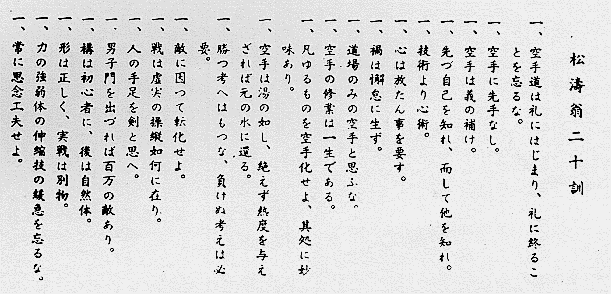Karate is like boiling water; without heat, it returns to its tepid state
空手は湯の如し絶えず熱度を与えざれば元の水に還る

This is the eleventh in a series of posts to examine Shotokan’s niju kun, Gichin Funakoshi’s list of 20 guiding principles for karate.

The eleventh principle is:
空手は湯の如し絶えず熱度を与えざれば元の水に還る
In Romaji:
Karate wa yu no gotoshi, taezu netsu o ataezareba moto no mizu ni kaeru.
The translation you see most frequently is:
Karate is like boiling water; without heat, it returns to its tepid state.
This one is special to me because it was (and still is) framed above the attendance desk at my old dojo in Illinois. It was right there, staring me in the face every time I signed in to class. Consequently, when our chief instructor retired, we gifted him with a makiwara board with this precept burned into it.

Of course what this precept is trying to say is that you should always continue your training because, if you don’t, you’ll start to lose your “edge” relatively quickly. But this isn’t news, is it? Most things are that way. If you practice pocket billiards 12 hours a week, you’ll get pretty good. If you stop practicing, you’ll start to get worse.
But is there more? (Hint: Of course there is.)
For a long time, I really felt that “tepid” was the wrong word to use here. Tepid means “lukewarm”, which seemed wrong for two reasons:
- It’s not linguistically supported. The kanji “元” means “original”, “former”, or “beginning.” There’s no sense of “lukewarm-ness” with this character.
- It’s not accurate. Removing heat doesn’t return water to a “lukewarm” state, it returns it to it’s “original” temperature - “room” temperature.
Or does it? 🤔
The more I think about it, the more “tepid” grows on me. Here’s why:
If you remove the water from heat, it starts to cool off, approaching “room temperature”, but the temperature of the room will have gone up just a bit by virtue of having boiled the water in the first place. This harkens back to precept #8, “Karate goes beyond the dojo.” What you do in the dojo can’t help but affect your life in other ways.
If the room and the water are a closed system, that water will always be warmer than when it started, as will the room. In the same way, karate training improves your karate, but cannot help but “bleed over” and change (and hopefully improve) the rest of your life as well.
So the original message of “keep training or you’ll lose your edge” has revealed something of a silver lining. Of course it would be best to keep training, but even if something happens, your life will have been forever enriched by the training you completed.
To put that another way, I’m constantly hearing people say they always wanted to do martial arts, but they’re too [insert excuse here] to start now. On the other hand, I’ve never heard anyone say they were sorry they trained.
As such, I can’t help but think that the Okinawans had it right when they made karate training compulsory in schools. Growing up in the midwest, I imagine most of my classmates would have gladly traded our compulsory square-dancing lessons for karate lessons instead.